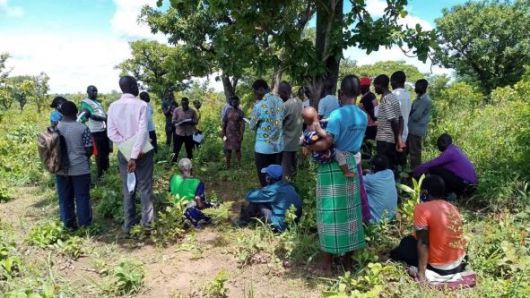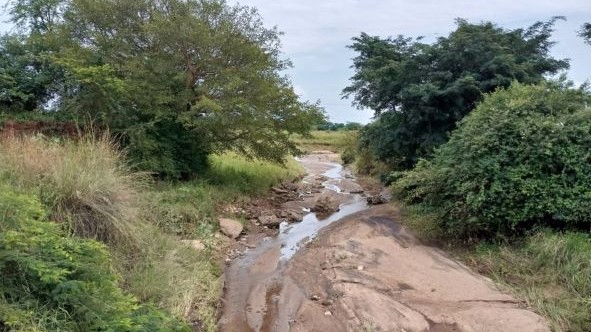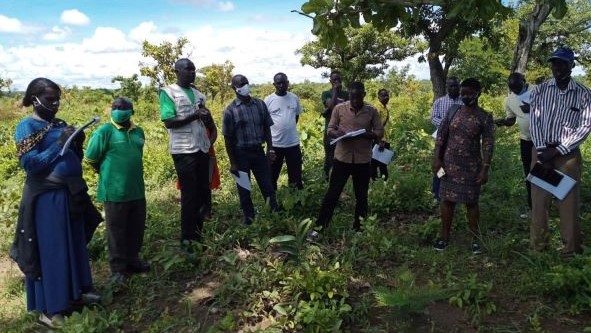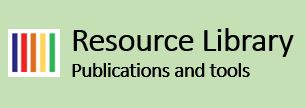08/09/2021 - Restoring Uganda’s Aswa Basin

Training on FMNR involved both the local authorities and the community members Picture: CARE Uganda
Farmers in Uganda have been trained on the restoration of degraded eco-systems by Wetlands International under the Partners for Resilience Eco-DRR programme, supported by UN Environment Programme and European Union.
The below story has been published by Wetlands International (see here).
Globally, climate change has largely been recognised as human-induced with ecosystems degradation as one of the major impacts. Well maintained ecosystems aid to lower disaster effects on people, livelihoods, infrastructure and economies. In contrast, degraded ecosystems are a leading driver of disaster risk. When ecosystems deteriorate, their services decline or are completely wiped out. This makes disaster impacts have a higher toll which affects recovery or restoration efforts and regeneration after calamity.
Draining an area of 27,677 square kilometres and covering 15 districts in northeastern Uganda, Aswa River Basin flows northwest into South Sudan to join the White Nile. Aswa River Catchment is delineated into eight tributaries or sub-catchments, with wetlands covering about 2,045 square kilometres. Aswa wetlands are a key source of water for domestic use, firewood and charcoal, pasture and water for livestock, agriculture, fish, raw materials for the local handicraft industry, products of the shea butternut, clay and sand for construction. The ecosystem also provides crucial regulating, supporting and cultural services for the community.
Despite these immense environmental and socio-economic values and services, Aswa is degraded by human activities. These include increased siltation, reduced water flow volumes and water quality, and declining ability to check storm run-off and floods. In the past decade, the basin has been experiencing more frequent and prolonged droughts than before due to increasingly erratic rainfall patterns. Subsequently, these negatively impact agricultural land use by decreasing the growing seasons, hampering crop production, undermining the availability of water resources, altering food and nutrition security. In addition, pastoral communities are on the move more frequently and this leads to resource-based conflicts and degradation of ecosystems.
To address these challenges, Wetlands International, in collaboration with partners and local authorities, is implementing a three-year project on upscaling ecosystem-based disaster risk reduction in Agago sub-catchment, one of Aswa’s tributaries.
Farmer-Managed Natural Regeneration
To strengthen the natural resource base of the Agago River from which the community derive livelihoods and to build the resilience of communities and wetlands ecosystem against natural disasters, Wetlands International and the Partners for Resilience (PfR) Alliance members are promoting Farmer-Managed Natural Regeneration (FMNR). FMNR is one of the cost-effective approaches among smallholder farmers that will help attain the overall 8,000 hectares of land planned for restoration and protection in the upper Agago River catchment.

Restoring micro-catchments will curb siltation and increase water flow volume into Aswa’s tributaries.
Through this approach, technical support is provided in the form of Training of Trainers (ToT), training workshops at lower levels, establishment of host farmer demonstration sites and farmer field schools, and provision of forestry extension and advisory services. Smallholder farmers, private and communal forest owners are enabled in restoring degraded farmlands and woodlands forest cover. The emphasis is on farmers managing natural regeneration rather than prescriptive and project-directed regeneration. Essentially, this means that it is the farmers who decide what species to protect, when and how to prune, how to share the proceeds, what to do about infringements on agreed rules, the respective roles of and benefits to women, men, vulnerable groups, amongst others.
Training Okom FMNR Champions
FMNR entails growing trees from living tree stumps, tree roots and seeds in the fields, grazing lands and degraded forests. In the local Luo dialect, a tree stump is known as okom. The key advantages of this approach are that: it is a low cost, simple and sustainable land restoration practice; it involves the selection, pruning and maintenance of trees. Also, it is a community empowerment practice for re-greening peoples’ mindsets and enhancing relationships between communities with nature and their landscapes. And finally, it is a viable response to deforestation and the resultant adverse effects on biodiversity & livelihoods.
In pursuit of this endeavour, 28 trainees cum trainers (ToT) were tutored. They were district government officers, field officers from NFA, sub-county extension officers, local micro-catchment committees and CSOs and media. These participants were guided on how to organise and facilitate a wide range of sessions and topics for FMNR implementation.
The key achievement was equipping the ToTs with practical knowledge on a step-by-step guide on FMNR, and in the development of a six-month roadmap for the implementation of the approach in the Aswa Wetlands Basin. The roadmap entails awareness creation, identifying and training Community FMNR Champions (Okom) integrating FMNR activities into plans and budgets, selection and establishment of demonstration sites, and monitoring and documentation.
In addition, the extension workers at the sub-county shall incorporate FMNR into their work plans and daily field practices with the supervision of the oversight roles by the relevant local district officers. The participants were also on how to scale up the FMNR approach and promote effective farmer-to-farmer learning.

A six-month roadmap was developed to help the ToTs plan and budget for the training of Okom champions. Picture: CARE Uganda
FMNR efforts are complementary to other ongoing reforestation, agroforestry, wetlands and riverbanks restoration interventions in the Agago River Catchment. If well implemented, FMNR shall, in the medium to long-term, contribute to enhanced conservation, protection and management of wetlands ecosystems and other natural and environmental resources for lasting ecological and economic sustainability, and increased ecosystems, community and household resilience to climate change-induced natural disasters.
This ecosystem restoration initiative uses an Integrated Risk Management (IRM) approach. It involves ecosystem management and restoration, climate change adaptation and mitigation, and disaster risk reduction while mainstreaming gender in all its activities. Awarded by the European Commission (EU DEVCO) to the UN Environment Programme (UNEP) in collaboration with Partners for Resilience (PfR) represented by the Netherlands Red Cross (NLRC), it focuses on scaling-up Eco-DRR interventions.





